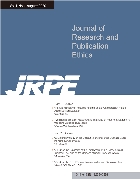 E-ISSN : 2733-7146
E-ISSN : 2733-7146
Vol.1 No.1
Abstract
Purpose: The main purpose of this study is to identify the cause and problem of one plagiarism and suggest a solution. Research design, data and methodology: Based on the Center for Research Ethics Information, this study analyzed the total of 17 cases from October 3, 2017 to June 16, 2020. Results: As seen in the case of this study, the Supreme Court's verdict on plagiarism requires clear sources, whether it is plagiarism or self-plagiarism, and the criterion for plagiarism is the time of writing the work, and the final judgment will be conducted by the court. Evidence-based sources indicate that the researcher or professor provides a lot of anticipation to the academic development and readers who read it. In addition, it is necessary to revise and submit the thesis judge's point of view in the thesis for doctoral dissertation within the proper and reasonable scope. The implications are also very large. Lastly, the reason for dismissal of a doctoral dissertation plagiarized at the time of recruitment is recognized Research ethics should be institutionalized in educational institutions or research institutions. Conclusions: Research ethics education should be strengthened in universities and research institutes. Research ethics is a code of ethics that must be ruled by everyone who explores.
Abstract
Purpose: This study is to review and analyze orientation and strategy of the East Asian Journal of Business Economics and all of the published articles of 2013 to 2020 and to investigate the previous publication system and process in order to enhance the general quality of EAJBE. Research design, data and methodology: This paper applied a case study method and analyzed the previous published articles and system including homepage of East Asian Journal of Business Economics. Results: This journal strives to be the most globalized than other domestic journals in the field of management/economy, and since its inception in 2013, all the papers is written in English, and more than 40% of the contributors are overseas contributors, so it is developed by global strategies in a different direction from other domestic journals. Conclusions: The EAJBE provides the full text of the contributors' research ethics regulations to the online system, and mandates researchers to submit a pledge from the stage of the contribution. The journal provides clear criteria such as self-plagiarism and duplicates publication, and specifies the copyright agreement and submission application twice, and guides the contributors and the reviewers to use the system in advance.
Abstract
Purpose: This study is to develop managerial implications for JSAS for advancing to highly qualified journal and achieving its goals. Furthermore, the study sough to deduce implications of ethical issues of JSAS and to generate insights and future directions for JSAS management. Research design, data and methodology: This study employed a qualitative approach to review the current status of JSAS including its aims, managerial strategies and ethical systems. The study discussed ethical issues about fake journals and predatory journals to analyze the current states of JSAS's ethical system and to compare with each other. Results: Results indicated that JSAS has abided ethical requirements of common journals and established strict criteria, yet it should continuously observe blind peer-review systems to avoid unnecessary risks of being perceived as predatory journals. The rigorous ethical obedience will help JSAS to effectively perform its managerial strategies and to achieve its goals: Increasing submissions, inviting prestigious scholars to board member, and advance to high quality of journal. Conclusions: Continuous efforts of JSAS for ethical management is the most effective method to move to a high qualified international journal with reputation in academia. With the consideration of Korean journal society, ethical studies need to be further conducted.
Abstract
Purpose: Focusing on Supreme Court precedents, we intend to establish criteria for judging research misconduct. Research design, data and methodology: In addition, I would like to propose the criteria for judging research misconduct by the KODISA, which applies the court's standards well in practice, and guidelines for preventing research misconduct. Research design, data and methodology: After classifying the case of research misconduct into six cases, the court's judgment and practical application will be reviewed. Results: First, research misconduct that has passed the disciplinary prescription can be punished. This is because the state of illegality continues to this day. Second, even if there were no punishment regulations at the time of research misconduct, it can be retroactively punished with the current punishment regulations. This is because research ethics is a universal and common standard and does not change. Third, if there is a fact that infringes on intellectual property rights, it is presumed unwritten intentions. Therefore, the act of taking and using the work of another person without permission or proper citation procedure, even if it is unintentional and for the public interest, is a research misconduct. Fourth, if there is an inappropriate citation notation, the intention of research misconduct is presumed. It is the judgment of the court that even if a quotation is marked, if it is incomplete, it is recognized as plagiarism. Fifth, if the author uses the work of another person without proper source indication, it is plagiarism even if the other person who owns the copyright agrees to it. The understanding or consent of some parties does not justify research misconduct in violation of public trust. Sixth, it is a research misconduct to create a new work without citations for one's previous work. In addition, even if there is a citation, if the subsequent writing is not original, it is a research misconduct. Conclusions: Academia should clarify the scope of research misconduct by referring to the Research Ethics Regulations of KODISA, and deal with research results that lack the value as creative works similar to those of research misconduct.













